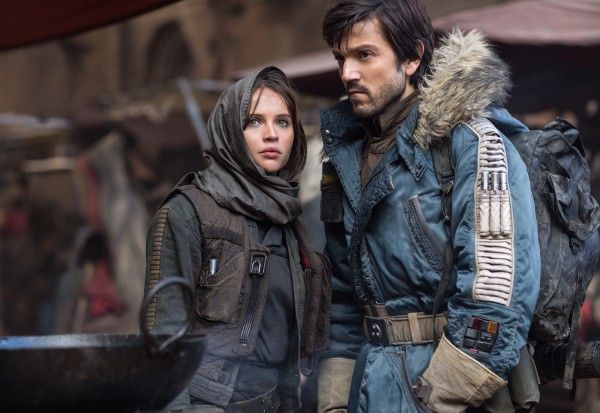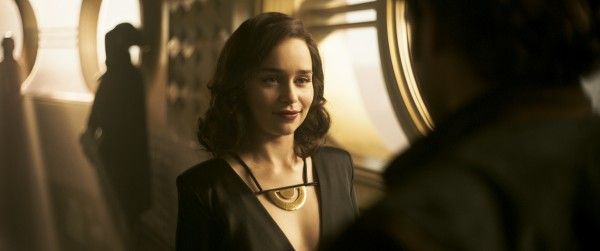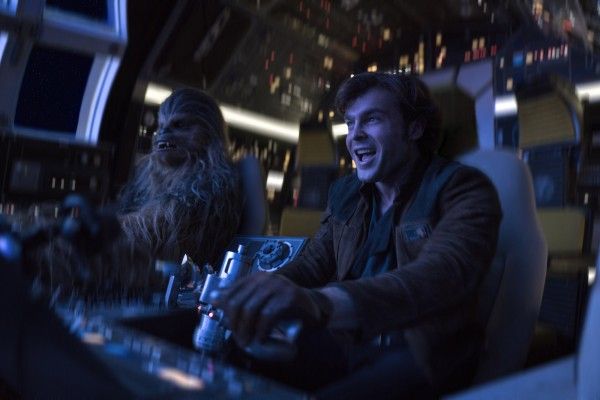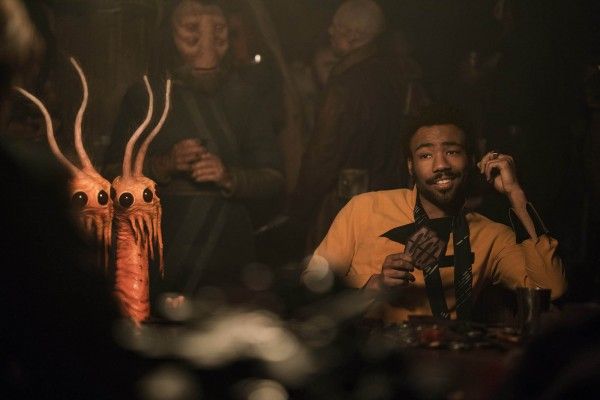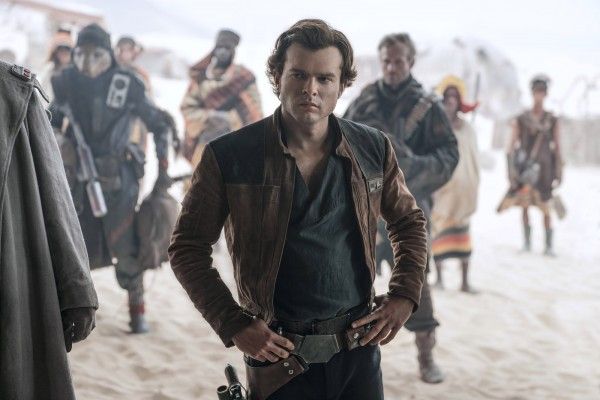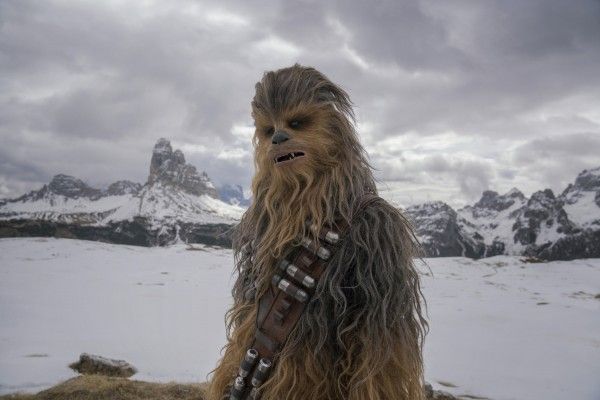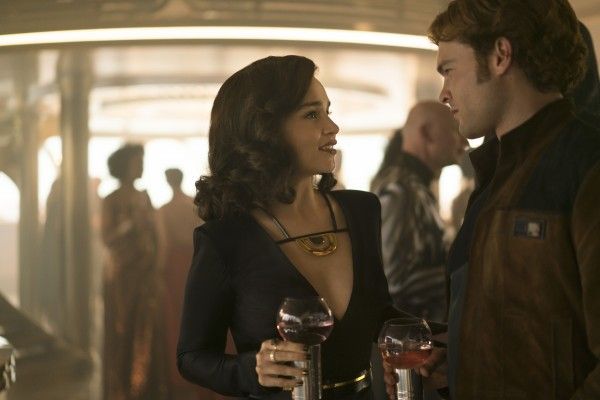Spoilers for Solo: A Star Wars Story and other Star Wars films follow below.
When Disney purchased Lucasfilm back in 2012, we knew Star Wars would never be the same, but we didn’t quite know how. George Lucas chose Kathleen Kennedy as his predecessor to oversee Lucasfilm, but now under the Disney banner, the production studio was part of a mega machine that answered to shareholders. Gone would be the days when Star Wars movies could come out in trilogy bursts and then go back into hibernation for a decade or so. Disney is in the business of quantity, and they were keen on not only kickstarting a new Star Wars trilogy, but also finding ways to expand the franchise to parts unknown.
Key in this plan was A Star Wars Story, which became the moniker for what were once deemed “anthology” movies. When work began on putting together Episode VII, Kennedy was also meeting with other filmmakers to begin to develop spinoff stories separate from the episodic timeline. Ideas for a Yoda movie, a Boba Fett movie, and an Obi-Wan Kenobi movie were kicked around, but the first-ever Star Wars spinoff out of the gate would be Rogue One, which was an idea hatched by ILM veteran John Knoll about a ragtag group of individuals who stole the Death Star plans. It’s a New Hope prequel, but focusing on non-Skywalker and non-Jedi characters.
That resulting film, despite production issues galore, was received quite warmly, and indeed while the quality of Rogue One can be debated, the mere experience of seeing a Star Wars movie that looked and felt so different was refreshing and unique. The film also (spoiler alert) killed off the entire main cast by the end, so this wasn’t a shameless ploy to begin a new franchise. It was a one-off experiment, and it worked to the tune of $1 billion worldwide.
The second Star Wars Story, however, is a far different affair, and it very much feels like a hint towards where the Disney Lucasfilm is going in the future. Solo: A Star Wars Story is far from a one-off, and is instead the first Star Wars movie that feels like an open-ended question as opposite to the beginning chapter of a story with a conclusion. Yes The Force Awakens is a “beginning,” but it also clearly sets up a story with a finite conclusion—specifically the arcs of Rey and Kylo Ren. Even Phantom Menace has its sights set on the tragic transformation of Anakin Skywalker into Darth Vader.
But Solo introduces plot threads, characters, and teases with no definitive conclusion, setting them up for future sequels or spinoffs in a way that feels unique in the Star Wars realm, and also off-putting. Wanna see more of the adventures of Lando Calrissian? Maybe you’ll get to! Curious to see the backstory behind Han Solo’s relationship with Jabba the Hutt? That gets teased pretty heavily too! But it’s the cameo at the end of the movie that’s the real sequel bait. It’s revealed that Qi’ra (Emilia Clarke)—Han Solo’s (Alden Ehrenreich) childhood friend and first love—is working for Darth Maul (Ray Park), who calls her home at the film’s conclusion as she’s assumed the leadership role in the Crimson Dawn crime syndicate that was previously filled by the now-dead Dryden Vos (Paul Bettany).
The Darth Maul scene comes across so blatantly like a tease for a sequel that it’d feel right at home at a post-credits scene, a la the Marvel Cinematic Universe. And indeed, at its foundation, Solo: A Star Wars Story feels like the beginning of the MCU-ification of the Star Wars franchise. It’s a film that’s fine, fits well into the Star Wars universe while also carving its own unique genre niche, but is also inessential to understanding the full story.
Indeed, Solo feels like the first disposable Star Wars movie ever made. Attack of the Clones is a bad movie, but it’s still crucial to understanding the mythology of the Skywalker story. And while in hindsight Rogue One is pretty inessential as well, at the time it felt like a must-see because audiences were primed to thinking that every Star Wars movie had to be seen to understand the full story. That’s no longer the case, and Solo proves it.
To be clear, I’m not comparing Star Wars to the MCU in a derogatory fashion. The Marvel Cinematic Universe is the most consistently successful franchise going right now, cranking out hit after hit and allowing each of their films to reach different audiences while saving the “must-sees” for the big team-up Avengers movies. And fans are completely fine with this arrangement, as evidenced by the record-breaking box office for Avengers: Infinity War and smashing success of Black Panther. Some Marvel movies are better than others, a couple of them are great, but I don’t think anyone would argue that Ant-Man or Iron Man 2 are “essential” to understanding what’s going on in the MCU.
And so here we are with Solo, the Ant-Man of the Star Wars franchise. It’s a perfectly fine film with a few bright spots here and there, but is it crucial to understanding who Han Solo is as a character? Definitely not. Is it a fun ride for die-hard Han Solo fans? Sure, and maybe that’s the point.
The opening weekend box office for Solo is a low point for the Star Wars franchise, but if Disney is going to release one new Star Wars movie a year until the end of time, they’re not all going to reach Force Awakens numbers—just like not every MCU movie cracks $100 million on opening weekend. Granted, Disney releases three Marvel movies a year, not one, so they can afford to have some singles and doubles, and perhaps Solo’s disappointing debut will spur a course-correction at Lucasfilm. But we’ve already reached the point of no return.
It’s clear coming out of Solo that Star Wars will never—and can never—be precious again. When every Star Wars film was an episode in an over-arching story, each movie was greeted with intense fervor and anticipation, followed by years of dissection, debate, and discussion. But in the Disney-owned Lucasfilm era, we’re approaching the end of the Skywalker story, and the future lies in quantity above all else. The more you have of something, the less precious it becomes.
Episode IX will mark the conclusion of this current storyline, and Lucasfilm has already started making plans for the years ahead. Boba Fett and Obi-Wan movies are in active development, Rian Johnson is creating a new trilogy with new characters, and Game of Thrones showrunners D.B. Weiss and David Benioff are writing and producing their own series of Star Wars movies. These films may or may not expand the Star Wars universe, some will be better than others, and inevitably, some will be largely inessential.
This kind of growth was inevitable the moment Lucas signed over Lucasfilm to Disney, and Solo—which is perfectly satisfactory but largely perfunctory—feels like the first Star Wars movie to really underline that point. There will certainly be growing pains, but there’s also no way Disney will look at Solo’s low box office returns and decide to just stop making spinoffs altogether. They’ll tweak and adjust accordingly, just as Marvel Studios did in the early days of the MCU, and they’ll find some sort of sweet spot that is amenable to both Star Wars fans and their shareholders. But one thing’s for certain: It’s too valuable a brand to keep it boxed up, released in limited edition spurts. Star Wars is part of a new world now, one in which the MCU is king. And imitation is indeed the best form of flattery.
For more on Solo, peruse links to our recent articles below:
- 'Solo' Spoiler Review; Digging into the Twists and Turns
- 'Solo': Woody Harrelson and Thandie Newton on How the Train Sequence Changed During Production
- 'Solo' Has a Deeply Twisted and Messed Up Moment That No One in the Movie Acknowledges
- 'Solo': Breaking Down That Surprising Cameo


